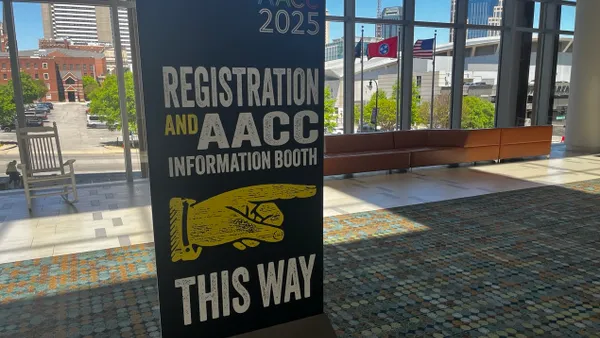Dive Brief:
- Roughly two-thirds of colleges are making it a priority to create virtual versions of on-campus classes and programs, according to an annual survey of chief online learning officers.
- College officials likely see creating online versions of existing programs as easier than launching entirely new academic programs, according to the report.
- However, 48% of chief online learning officers still said their priorities included launching new online programs with no campus equivalent.
Dive Insight:
The ninth Changing Landscape of Online Education report — from Eduventures Research, Quality Matters and Educause — offers a look at how colleges are approaching online education.
“While institutions exhibit varying approaches and priorities in their online strategies, there appears to be a common acknowledgment of the driving forces behind the expansion of online offerings and associated marketing efforts: recruiting new students and fulfilling current students’ needs,” the report’s authors wrote.
The survey found 69% of respondents said it’s a priority to create online versions of face-to-face classes.
A slightly lower share, 65%, said the same about launching virtual versions of entire in-person degree programs.
This result suggests launching online programs may be a growing priority. In last year’s CHLOE survey, 42% of chief online learning officers said they were focusing on creating virtual versions of popular in-person programs.
The vast majority of respondents, 92%, said online offerings allow them to recruit students within their institutions’ regions, while 87% said it enables them to reach students outside of their traditional borders.
Almost half of respondents, 46%, said online enrollment at their colleges is outpacing growth in on-campus programs.
The survey asked respondents to forecast their top three online student markets for the future. More than three-quarters of respondents, 78%, listed adult undergraduates pursuing college degrees.
Adult students are typically considered those ages 25 and older. Colleges have been ramping up their efforts to recruit this population to prepare for the demographic cliff — a sharp decline in the number of high school graduates expected to start around 2025 due to lower birth rates during the Great Recession.
Graduate students pursuing degree programs are another area of focus. Over half of respondents, 53% — including colleges that don’t currently have graduate programs — deemed this group an important future market. Only 23% of respondents said the same of traditional-age students interested in fully online degrees.
The survey was conducted in January and February and drew responses from 324 institutions.
The report also offers insights into online program management companies, or OPMs.
These companies help colleges launch and run online programs, often in exchange for a share of their tuition revenue. However, critics of the sector contend that these deals push OPMs to aggressively recruit students and drive up the price of online education.
Scrutiny over OPMs has mounted after 2U — one of the sector’s most high-profile companies — declared Chapter 11 bankruptcy in July.
2U has said it doesn’t expect the Chapter 11 process to disrupt its services to colleges and their programs, but student advocates are pushing for policies to protect students in the event an OPM collapses altogether.
In the new survey, 68 chief online learning officers answered questions about their relationships with OPMs.
Some 15% of respondents said they currently work with an OPM, while 9% said they work with at least two OPMs. More than half of respondents, 52%, said they had never worked with one of these companies and don’t plan to. Another 15% said they previously worked with one or more OPMs and are not considering working with one again.














